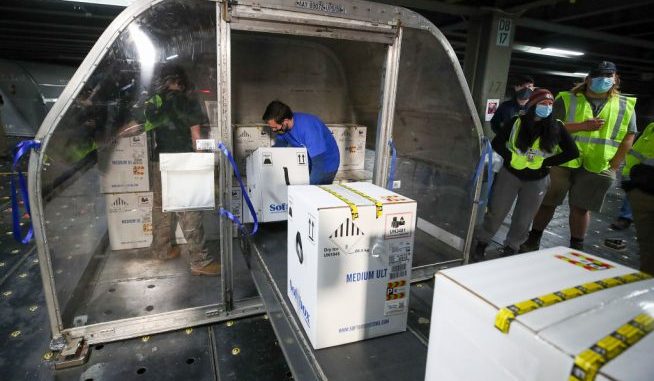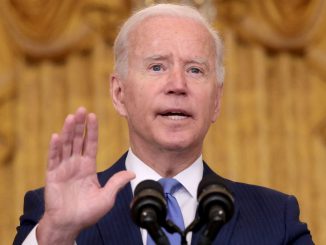

LOUISVILLE, KY – DECEMBER 13: Boxes containing the first shipments of the Pfizer and BioNTech COVID-19 vaccine are unloaded from air shipping containers at UPS Worldport December 13, 2020 in Louisville, Kentucky. Each box contains dry ice to keep the temperature at minus 70 Celsius and contains a GPS tracker. (Photo by Michael Clevenger – Pool/Getty Images)
OAN Newsroom
UPDATED 4:20 PM PT – Sunday, December 13, 2020
Following the FDA’s approval of the ‘Pfizer-BioNTech’ coronavirus vaccine, questions arose as to who should receive the drug first. Some federal health officials have pointed to the nursing home community as it is most at risk.
According to reports, all nursing homes nationwide have signed up for the federal distribution program and could be treated by Christmas.
Additionally, the indigenous Navajo nation has received one of the first shipments of the vaccine as they work to curb an influx of cases on the reservation.
Reports also state the first administration of the shot will go to frontline health care workers.
President Trump has touted Operation Warp Speed’s success in the development of the cure, claiming it would have taken five years to find a coronavirus vaccine if he weren’t the President.
From the instant the pandemic reached our shores, we raced into action to develop a safe and effective vaccine—and now, we are witnessing a monumental national achievement. pic.twitter.com/WnjlP3TGtt
— The White House (@WhiteHouse) December 13, 2020
Despite the government’s success in the vaccine’s development, authorities worry the general population may be hesitant to take it due to concern and skepticism.
In Sunday’s interview, FDA Chief Stephen Hahn said a “significant” number of the population needs to be vaccinated in order for the country to get back on track.
“We also need to be transparent [about]…what we don’t know and our process; this is our contribution to the transparency,” Hahn said. “We want the data to be known and we wanted that FDA Advisory Committee to be public because we wanted everyone in America…to see what information was available, and why we made the judgment we made about the safety and efficacy of the vaccine.”
He advised anyone with a known allergy to any component of the vaccine not to take it. He added the vaccine will be given out in places with the right tools and personnel available, in case someone has a reaction.
“We do not think that this is a highly frequent issue that will arise,” Hahn noted. “But we do want to be careful because vaccine safety and medical product safety, is top of mind for us.”
In the CDC’s Emergency Approval meeting, the agency’s advisory committee voted 11-0 to recommend the vaccine for Americans aged 16 and older. Additionally, the panel called for the elderly and health officials to receive it first.
They also plan to issue further guidelines for pregnant women and people with allergies.






Be the first to comment